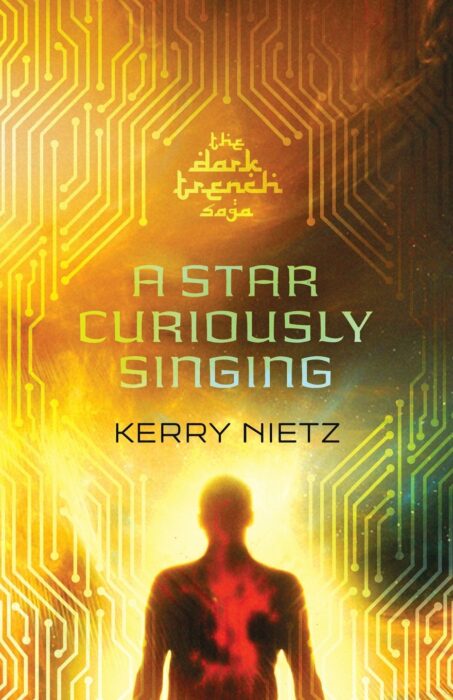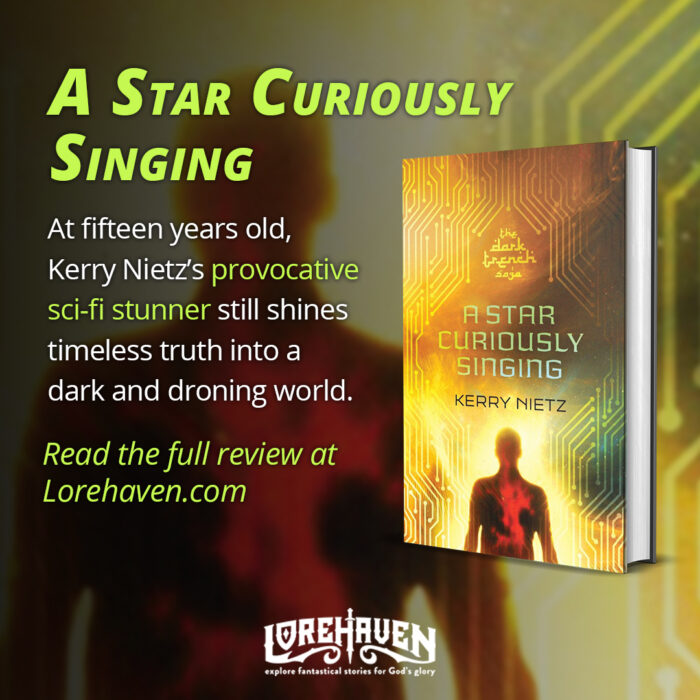At fifteen years old, Kerry Nietz’s provocative sci-fi stunner still shines timeless truth into a dark and droning world.
This reader came late to the 2009 science-fiction stunner A Star Curiously Singing, first in author Kerry Nietz’s DarkTrench Saga trilogy.
To this day, I’m unsure how I missed this novel until three years after publication. Its premise alone should have quickly captured me: a nano-wired debugger Sandfly investigates a strange robot failure, surviving in a future Earth ruled by sharia law.
Yes, sharia law. That’s the notion of the caliphate, a hypothetical future one-world government ruled by Muslims. Not all Muslims advocate this. But some do believe in this notion and even fight for this concept. Other people either refuse to admit that, or talk about it overmuch as if They are all coming for our children.
Come to think of it, in the early 2010s, the story’s premise backfired in my mind and made feel suspicious. I thought that no one would be brave enough to explore the logical conclusions of a sharia-ruled world. Or, even if someone did try this, I felt sure the themes or conclusions would be weakened—or used for political ends.
A Star Curiously Singing is nothing of the sort. Nietz knows Islam. He also knows how to craft a fully-realized, vivid, dusty, machinery-humming science-fiction world. His first-person style is immediate and cracking. And Sandfly makes a remarkable hero.
We catch up to Sandfly right in the middle of his job in an airship dock. He’s a teen mechanic, a veritable slave to his masters, but wields more powers than today’s engineers. He does not only program machines. He talks with them, sings to them, because his mind is itself implanted with equipment to manage this. Imagine a WiFi link in your head. Come to think of it, that would seem to simplify some daily tasks.
As a trained machine debugger, Sandfly is neither a poor helpless slave nor a perfectly capable protagonist. He’s practical. Resourceful. Sympathetic.
Soon he is summoned for a unique mission, into orbit, to investigate a robot that was on board a mysterious space probe. Something made this robot tear itself apart, and the Abduls of the caliphate, Sandfly’s masters, want answers.
Here is another defining strength of A Star Curiously Singing—realistic people, including villains who are neither merely trauma-troubled nor totally evil. Rather, their motives make sense. After all, any religion attracts honest devotees as well as opportunists who are mostly along for the ride. All these Abduls, and other Muslim leaders whom Sandfly meets, reflect this. In fact, I doubt the word “Muslim” occurs in the novel; the religion is just there. This grounds this world even more in reality.
Dust. Heat or cold. Metal. Code-and-command singing from machines. All remains vivid to me today. The story’s style itself resembles a song. Even apart from the God-exalting hero, plot, villains, and characters, this lifts Him up in worship.
A Star Curiously Singing helped me rejoice in our great Author, the God Who “sings” and reveals Himself. He shows great mercy to those who turn from their actual sin (not merely forbidden thoughts) and choose to fear Him. Yet He will not leave the guilty unpunished. Even in a world run by mechanized religion, He is still there.
To finish this novel, I stayed up late. And I don’t know if I have ever sympathized with or cheered so much for a fictitious robot.
Best for: Older teens and adults who enjoy desert– and then space-based sci-fi with direct yet minimalist conflict between false religion and true faith.
Discern: People experience mild technological torture in response to legalistically forbidden thoughts that include early romantic attraction, some violence and effects of violence, memories of bullying, robots threaten humans, frequent references to monotheistic non-Christian belief system.






























Thanks, Stephen. I’m glad you enjoyed the book, and really appreciate you taking the time to write about it. God Bless.
Kerry